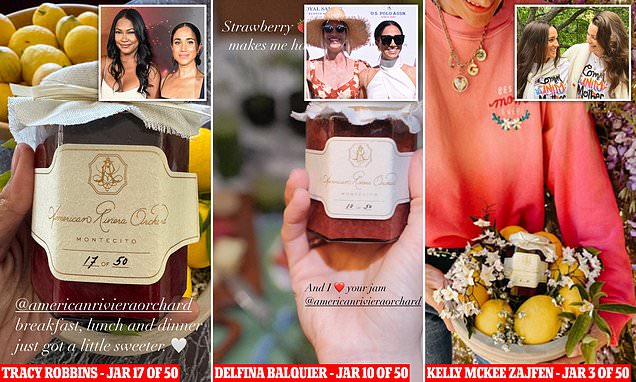Meghan Markle, the Duchess of Sussex, has always been a polarizing figure, with her every move scrutinized by fans and critics alike. Her latest venture, a lifestyle brand called As Ever, promised to bring a touch of her Montecito charm to the world through artisanal products like jams, teas, and honey. In early 2024, Meghan kicked off the brand’s promotion with a bold move: sending out 50 limited-edition jars of strawberry jam to key opinion leaders (KOLs), a term often used for influencers with significant sway in their niches. The plan seemed foolproof—leverage the star power of high-profile celebrities to create buzz around her new brand. However, the outcome was far from what she might have hoped. Only three of the recipients, described as among the least prominent of the group, publicly acknowledged the gift by posting about it on social media. This unexpected silence from the majority has sparked a wave of speculation, memes, and debates about the Duchess’s business acumen. What went wrong, and what does this mean for As Ever’s future? Let’s dive into the sweet and sticky details of this royal endeavor.
The Grand Launch Plan
When Meghan launched As Ever, it was clear she aimed to carve out a niche in the competitive world of lifestyle branding. The brand’s aesthetic—elegant, earthy, and aspirational—reflected her personal style, often showcased through her past projects like her now-defunct blog, The Tig. The strawberry jam, described as “crafted with a fluid texture” and inspired by a recipe from her Montecito kitchen, was positioned as the centerpiece of the brand’s debut. Each jar was labeled as part of a limited run, with numbers like “17 of 50” or “21 of 50,” adding an air of exclusivity. The decision to gift these jars to 50 KOLs was a classic marketing move, banking on the recipients’ large followings to amplify the brand’s reach.

The list of recipients was a who’s who of Hollywood and influencer circles. Names like Mindy Kaling, Kris Jenner, Chrissy Teigen, Tracee Ellis Ross, and polo player Nacho Figueras were reportedly among those who received the coveted jars. These are individuals with millions of followers, whose endorsements can turn products into overnight sensations. Meghan’s team likely expected a flood of Instagram posts, stories, and glowing reviews, showcasing the jam in beautifully styled breakfast spreads or chic gift baskets. The inclusion of personal touches, like envelopes with the recipients’ names in Meghan’s signature calligraphy, suggested a thoughtful, high-end approach to the campaign.
The Unexpected Silence
Yet, when the dust settled, only three recipients publicly acknowledged the gift. While the exact identities of these three KOLs haven’t been widely confirmed, sources suggest they were not A-listers but rather mid-tier or niche influencers with smaller, though still engaged, audiences. One was a fashion designer friend of Meghan’s, who posted a glowing review of the jam alongside a photo of a gift basket filled with lemons. Another was an actor who shared a similar setup, praising the jam’s flavor but not delving into much detail. The third was a lesser-known figure in the wellness space, whose post garnered modest engagement compared to what a celebrity like Kris Jenner might have achieved.

The silence from the remaining 47 recipients was deafening. Social media platforms, where influencers typically thrive on sharing gifted products, showed no trace of As Ever’s strawberry jam from the likes of Teigen, Kaling, or Jenner. This lack of response led to a flurry of questions: Did the KOLs receive the jars? Did they dislike the product? Or was there a deeper reason for their reluctance to promote it? The internet, as expected, had a field day. Memes circulated on platforms like X, with captions like “Meghan’s jam: the gift nobody asked for” and “50 jars, 3 posts—tough crowd!” Critics pounced, labeling the campaign a failure, while supporters argued that the silence might be strategic or unrelated to the product’s quality.
Possible Explanations for the Flop
Several factors could explain why Meghan’s jam campaign didn’t land as intended. First, the product itself may not have resonated with the recipients. While the jam was marketed as artisanal, some reports have suggested it was produced in a factory 2,000 miles from Montecito, in Illinois, by Republic of Tea, a company known for mass-producing teas and preserves. This revelation, which surfaced shortly after the campaign, may have dulled the “homemade” allure that Meghan’s team emphasized. Influencers, who often pride themselves on authenticity, might have hesitated to endorse a product that didn’t feel as exclusive or handcrafted as advertised.
Second, the timing and context of the campaign may have played a role. Meghan’s public image has been a lightning rod for controversy, with every business move dissected by both supporters and detractors. Some KOLs, particularly high-profile ones, might have been wary of associating with a brand tied to such polarizing figure, especially if they feared backlash from their own audiences. The royal family’s ongoing tensions, including Meghan and Prince Harry’s strained relationship with the British monarchy, could have added another layer of complexity. Endorsing As Ever might have felt like taking sides in a cultural or political debate, something many celebrities prefer to avoid.
Third, the expectations for influencer marketing may have been misaligned. In 2024, audiences are increasingly savvy about sponsored content, and influencers are selective about what they promote. A single jar of jam, even a limited-edition one, might not have been compelling enough to warrant a post, especially for celebrities with packed schedules and multiple brand deals. Unlike a luxury handbag or a skincare line, jam is a low-stakes product that doesn’t naturally lend itself to glamorous social media content. Without a clear incentive—like a paid partnership or a broader campaign—many KOLs may have simply set the jar aside.

The Bigger Picture: As Ever’s Challenges
The jam campaign is just one piece of As Ever’s broader journey, which has faced its share of hurdles. The brand’s first product drop, which included the strawberry jam, sold out in under an hour on April 2, 2024, signaling strong initial demand. However, subsequent drops, including a raspberry spread and an apricot preserve, struggled with supply issues, leaving customers frustrated and empty-handed. Some reports indicate that Meghan’s team is considering switching suppliers to address these shortages, a move that could improve scalability but risks further scrutiny over the brand’s “artisanal” claims.
Meghan’s foray into lifestyle branding also comes at a time of intense competition. The market is saturated with celebrity-driven brands, from Gwyneth Paltrow’s Goop to Reese Witherspoon’s Draper James. To stand out, As Ever needs a unique selling proposition beyond Meghan’s name and royal title. The jam, while a charming start, has been criticized by some experts for its high price point—$6.50 to $9 per jar—and its lack of innovation. Competitors like Bonne Maman offer similar products at lower prices, while niche brands emphasize organic, locally sourced ingredients. Meghan’s decision to expand into rosé wine, launched on July 1, 2025, suggests an attempt to diversify, but it remains to be seen whether this will resonate with consumers.
Supporters and Defenders
Not everyone sees the jam campaign as a failure. Some argue that the limited posts from lesser-known KOLs were intentional, designed to create a grassroots buzz rather than a celebrity-driven spectacle. By focusing on niche influencers, Meghan may have aimed to build authenticity and connect with smaller, dedicated audiences. Others point out that the sold-out status of the first drop proves consumer interest, regardless of the influencer response. Fans on platforms like X have rallied behind Meghan, praising her entrepreneurial spirit and dismissing the criticism as another attempt to undermine her.
There’s also the possibility that the campaign’s impact is still unfolding. Influencer marketing often works on a longer timeline, with some KOLs choosing to post weeks or months after receiving a product. The three posts that did emerge may have planted seeds for future engagement, especially if As Ever rolls out more compelling products or a stronger narrative. Meghan’s Netflix series, With Love, Meghan, which launched in 2025, could provide a platform to showcase the brand and rekindle interest in the jam.
What’s Next for Meghan and As Ever?
The jam saga underscores the challenges of transitioning from royalty to entrepreneurship. Meghan’s vision for As Ever is ambitious, blending her passion for food, hospitality, and design into a cohesive brand. However, execution will be key. To succeed, As Ever must address supply chain issues, refine its messaging, and find ways to stand out in a crowded market. Meghan’s personal involvement—seen in videos of her stirring jam with her daughter, Lilibet—adds a relatable touch, but it may not be enough to counter perceptions of inauthenticity.
For now, the limited response from KOLs serves as a cautionary tale about the unpredictability of influencer marketing. Meghan’s team may need to pivot, perhaps by focusing on direct-to-consumer sales, partnerships with high-end retailers, or more interactive campaigns. The rosé wine launch, timed to coincide with Princess Diana’s birthday, suggests a willingness to take risks and lean into emotional storytelling. If As Ever can harness Meghan’s charisma and refine its strategy, the brand could still find its footing.
In the end, the story of Meghan’s strawberry jam is more than a marketing misstep—it’s a snapshot of a woman navigating uncharted waters. Whether she emerges as a lifestyle mogul or faces more setbacks, one thing is certain: the world will keep watching, and the buzz, for better or worse, will continue.




